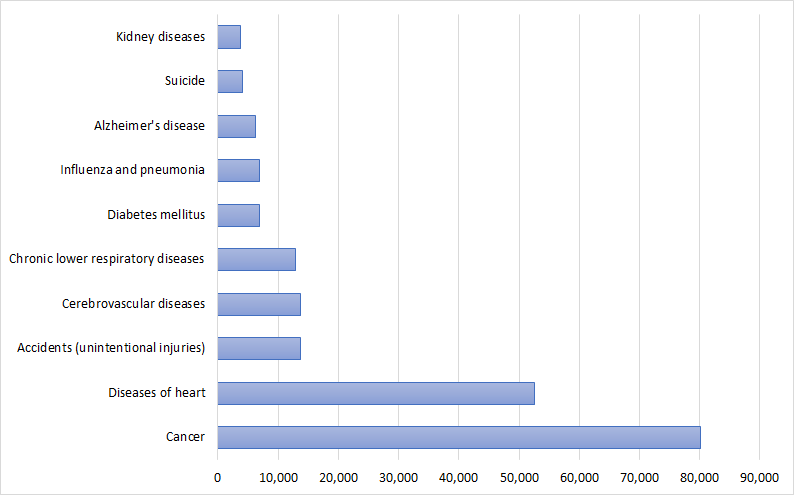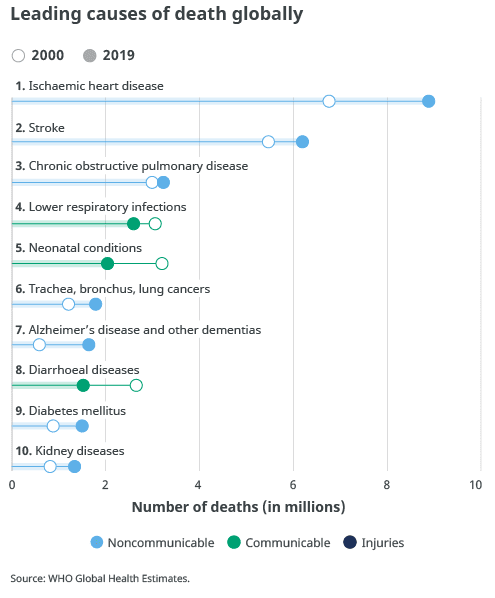174 Most Common Causes of Death
Martha Lally; Suzanne Valentine-French; and Dinesh Ramoo
Canada: Acute and chronic respiratory diseases, Alzheimer’s disease, and cardiovascular diseases are the major causes of death in Canada. As seen in Figure 10.2, cancer, cardiovascular diseases, and accidents accounted for the majority of deaths in Canada.
The United States: In 1900, the most common causes of death were infectious diseases, which brought death quickly. Today, the most common causes of death are chronic diseases in which a slow and steady decline in health ultimately results in death. In 2015, heart disease, cancer, and chronic lower respiratory diseases were the leading causes of death in the US (Centers for Disease Control and Prevention, 2016).

The causes of death vary by age (see Tables 10.1 and 10.2; adapted from Centers for Disease Control and Prevention, 2015). In infancy, congenital problems and other birth complications are the largest contributors to infant mortality. Accidents, known as unintentional injury, become the leading cause of death throughout childhood and early adulthood. In middle and late adulthood, cancer and heart disease become the leading killers.
| < 1 | 1–4 | 5–9 | 10–14 | 14–24 |
|---|---|---|---|---|
| unintentional injury | unintentional injury | unintentional injury | unintentional injury | |
| congenital abnormalities | malignant neoplasms | malignant neoplasms | homicide | |
| homicide | congenital abnormalities | suicide | suicide | |
| malignant neoplasms | homicide | congenital abnormalities | malignant neoplasms | |
| heart disease | chronic lower respiratory disease | homicide | heart disease |
| 25–34 | 35–44 | 45–54 | 55–64 | 65+ |
|---|---|---|---|---|
| unintentional injury | unintentional injury | malignant neoplasms | malignant neoplasms | heart disease |
| suicide | malignant neoplasms | heart disease | heart disease | malignant neoplasms |
| homicide | heart disease | unintentional injury | unintentional injury | chronic lower respiratory disease |
| malignant neoplasms | suicide | liver disease | chronic lower respiratory disease | cerebrovascular disease |
| heart disease | homicide | suicide | diabetes mellitus | Alzheimer’s disease |
The world: The most recent statistics analyzed by the World Health Organization were in 2012, and non-communicable deaths, that is, those not passed from person to person, were responsible for 68 percent of deaths (World Health Organization, 2016). The four most common non-communicable diseases were cardiovascular disease, cancer, diabetes, and chronic lung diseases. In contrast, communicable diseases, such as HIV and other infectious diseases, neonatal and maternal mortality, and nutritional problems caused 23 percent of the deaths, and injuries caused the remaining 9 percent of the deaths.

Tobacco use is attributed as one of the top killers, and is often the hidden cause behind many of the diseases that result in death, such as heart disease and chronic lung diseases (World Health Organization, 2016).
These statistics hide the differences in the causes of death among high- versus low-income nations. In high-income countries, defined as having a per-capita annual income of $12,476 or more, 70 percent of deaths are among people aged seventy and older. Only 1 percent of deaths occur in children under the age of fifteen. People predominantly die of chronic diseases, such as cardiovascular disease, cancers, dementia, or diabetes. Lower respiratory infections remain the only leading infectious cause of death in such nations. In contrast, in low-income countries, defined as having a per-capita annual income of $1,025 or less, almost 40 percent of deaths are among children under age fifteen, and only 20 percent of deaths are among people aged seventy years and older. People predominantly die of infectious diseases such as lower respiratory infections, HIV/AIDS, diarrheal diseases, malaria, and tuberculosis. These account for almost one third of all deaths in these countries. Complications of childbirth due to prematurity, birth asphyxia, and birth trauma are among the leading causes of death for newborns and infants in the poorest of nations (World Health Organization, 2016).
Media Attributions
- Figure 10 2 © Dinesh Ramoo is licensed under a CC BY-SA (Attribution ShareAlike) license
- Figure 10 3 © World Health Organization is licensed under a Public Domain license

